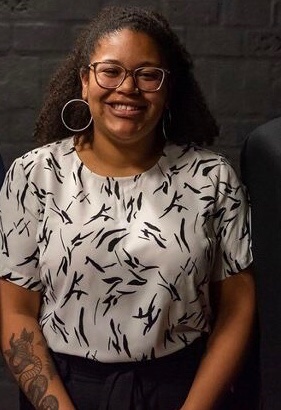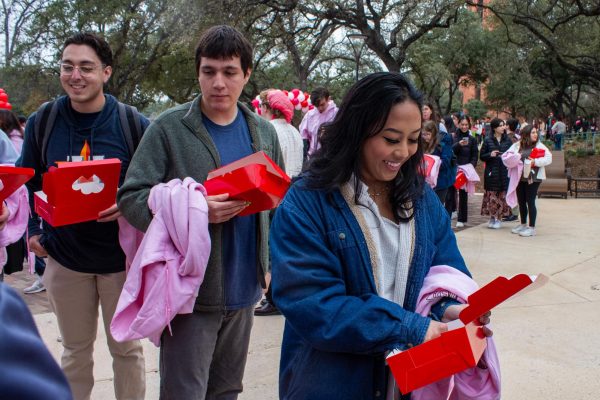Whether archaeology or the Roots Commission, Johnson has worked to dig up the truth
Student Spotlight: Senior Camille Johnson’s academic interests have shifted over her Trinity career, but she remains passionate nonetheless
This week’s student spotlight is Camille Johnson, senior anthropology major and triple minor in history, African American studies and museum studies.
The museum studies minor, first offered to Trinity students in Fall 2020, “explores the history, theory and management of museums and their collections,” according to Trinity’s website. Johnson managed to add the new minor after realizing she met most of the requirements.
“Dr. [Jennifer] Mathews and Dr. [Lauren] Turek and a couple of other professors worked to put it together,” Johnson said.
Johnson will be one of the first ever Trinity students to graduate with the new minor, thanks to the overlap with her other classes.
“The three minors that I’m currently doing have a lot of overlap in a way that I think is natural. A lot of the African American studies classes are history classes that are dual listed, same with the museum studies and history classes.”
The senior started off her Trinity career planning to major in anthropology and minor in geoscience.
“I was definitely more interested in the science side of archaeology, to a bigger degree, I think than I am now,” Johnson said.
In the first half of her Trinity career, Johnson was more focused on archaeology. In the summer of 2019, she completed Maya archaeological field work through Texas Tech University in Chan Chich, Belize.
“It really showed me that it is a viable option for something that I could do. As I started focusing more on the African American studies part of my academia, I realized that — ‘OK, the science side is starting to get to a point where I need to commit to that or to the other, more historical side of archaeology,’” Johnson said.
As she started taking more African American studies and history classes, she realized she wanted to dedicate her time to that.
“It became something that I had always been passionate about, but now I had some formal training in education on a lot of subject matter that coincides with my own lived experiences. It kind of created this bigger passion I had for it before.”
The triple minor also spent her first few years at Trinity working as a student assistant in the Diversity and Inclusion Office. Johnson worked with former DIO director Alli Roman to put together events like MLK Day.
“I just remember talking to Alli about plans for a decade down the road, which is so sad, and what her long-term plans were for the Diversity and Inclusion Office,” Johnson said.
Now that Courtney Balderas-Jacob has filled the position of DIO Director, Johnson reminisces on what she has learned during her time working with Roman.
“It was a really good experience and I learned so much. I think it really woke me up to the difficulty of social justice work. It really did teach me just about picking battles, about being disappointed with the pace things move at, that kind of thing,” Johnson said.
Though the senior says she valued her time as a student assistant, she says that she feels her greatest impact on the university was working on the Trinity Roots Commission.
“Me and a couple of other students — also anthropology and sociology majors — worked with some professors at Trinity from multiple departments and exposed the ties Trinity has to slavery and race relations in Texas,” Johnson said.
According to Johnson, prior to their research, the popular narrative was that Trinity didn’t have deeply rooted ties to slavery.
“The founders were already old men when they founded the university, so all of them have their own ties. It’s not like they just suddenly popped into existence in 1869,” Johnson said. “They owned land and slaves and money tied to the slave trade for decades before Trinity was founded, so it was kind of working to remind people of that — that Trinity is not clean.”
According to Johnson, a few Trinity professors are writing a book “about the historical narrative of what we’ve found out so far.”
She says her biggest advice to current students is to seek mentorship.
“I truly do not think I would be doing the stuff I’ve done, or gotten into the grad schools I’ve gotten into so far, without the mentorship I’ve had, so my genuine, biggest piece of advice to anybody at Trinity is to find a mentor,” Johnson said.
When asked who a few of her mentors were, Johnson was quick to answer.
“I think I’ve gotten really lucky with finding genuine mentors here. In the history department, Dr. Turek, and Dr. [Carey] Latimore, especially, really helped guide me and provided me with opportunities. Most of all, Dr. Mathews changed the course of my life on more than one occasion.”
After Trinity, Johnson is hoping to get a master’s degree in museum studies.
“I’ve debated between a Master’s and a PhD for a while, but I realized that a master’s is a much more viable option for me. In the last week, I’ve gotten into a couple of graduate schools,” Johnson said.









